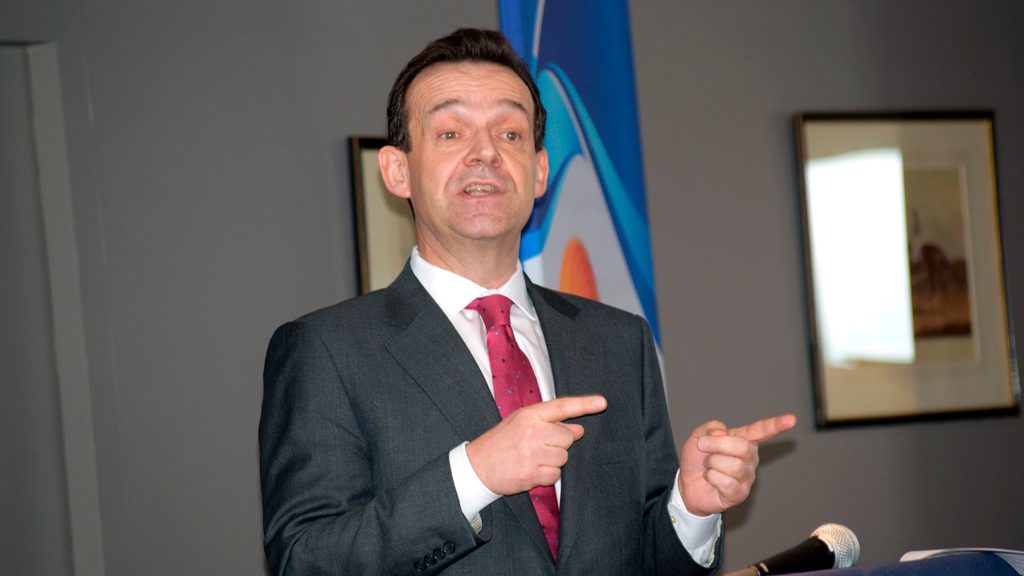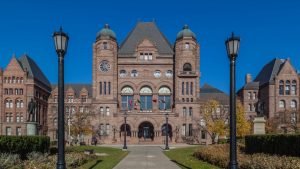On a day when there was a seamless change in the chairmanship of the Council of Ontario Construction Associations (COCA) at the council’s recent annual meeting, the turbulence that characterizes Ontario politics these days represented a stark contrast as COCA members gathered to listen to pre-election commentary during the keynote luncheon presentation.
“It’s interesting times, I am sure you will all agree,” commented Charles Bird, a principal at Earnscliffe Strategy Group, as he and fellow Earnscliffe principal Melanie Paradis kicked off the presentation at Woodbine Racetrack Feb. 22.
“We have to update our presentation every couple of hours. It really is an extraordinary time in Ontario politics to the point where the rest of the country and others have their eyes fixed on the Ontario PC Party.”
The comments proved prescient given the subsequent decision of former Progressive Conservative Leader Patrick Brown not to pursue the leadership Feb. 26 after throwing his hat into the ring 10 days earlier.
Brown’s sudden resignation on Jan. 25 amidst accusations of sexual misconduct threw provincial politics into an uproar less than five months before the June election.
Even with Brown factored into the equation during the COCA discussion, Bird suggested Doug Ford, the populist brother of late Toronto Mayor Rob Ford, had a good chance of winning the PC leadership on March 10.
“Ford has a very real chance of emerging victorious,” said Bird.
Factors favouring the Ford campaign include his popularity among social conservatives, his good standing within Ford Nation, which penetrates both the 416 and the 905 regions around Toronto, and his support among new Canadians, Bird said.
The other challengers are Caroline Mulroney, Christine Elliott and one-issue candidate Tanya Granic Allen.
Looking ahead to the June election, Paradis said, “The best thing that could happen to the NDP is if the PCs elect someone unelectable. If the Conservatives elect someone that Ontarians just could not stomach, then you could see a dramatic shift to the NDP.”
“There is a third way,” said Bird. “As we saw in 1990 with Bob Rae, if that NDP vote continues to rise at the expense of the Liberals, things begin to be very unpredictable.
“Given the circumstances of the Conservative party, it is not difficult to imagine Ontarians saying, ‘well you guys are crazy,’ then looking at Kathleen Wynne and saying, ‘I kind of like some of the things you are doing but I don’t like you,’ and that leaves one alternative.”
We need development to provide employment for our industry
— Steve Dietrich
COCA
The Earnscliffe duo said a probable strategy for the Liberals will be to continue their focus on progressive policies into the upcoming spring budget, marginalizing the NDP on the left, then turning their attention to the PCs.
“The 2018 budget will be absolutely critical. It is seen as a one-two punch in combination with the 2017 budget,” said Bird.
COCA president Ian Cunningham noted after the meeting the main issue COCA would like to see the parties address during the campaign was continued support for infrastructure.
“I think we want a government that supports infrastructure development,” he said. “The current government had a pretty ambitious infrastructure plan, $190-some billion over 13 years, and they lived up to their commitments. We’d like to see a government that continues to roll out public infrastructure to support a more modern and growing Ontario.”
Infrastructure spending was also a priority identified by new COCA chair Steve Dietrich, taking over from Gary van Bolderen, in his incoming remarks.
“We will be advancing the need for infrastructure. We need development to provide employment for our industry and we need to provide the structures that our fellow Ontarians need,” said Dietrich.
Cunningham also identified continued focus on construction lien regulations into the new year as another COCA priority, now that Bill 142 has been enacted.
“We want to see regulations that support Bill 142 and we want to push the construction lien modernization and prompt payment and dispute resolution, that piece, across the finish line,” he said.
Cunningham acknowledged Bill 148, with major reforms to the Employment Standards Act, was top of mind during COCA networking sessions but he didn’t think it would become a major election issue.
“There are some issues with Bill 148 where we are looking for relief until the next round of bargaining,” he said.
“We hope that we can work this out with the Ministry of Labour in the near future. It is not something that we have talked to the opposition parties about yet, and I am not sure it will make it into an election playbook.”











Recent Comments
comments for this post are closed